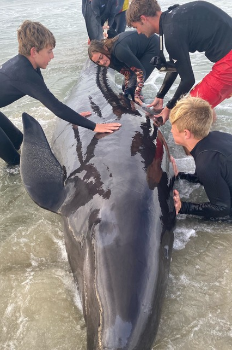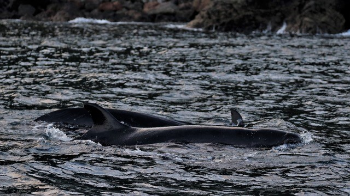
MANGAWHAI'S NO.1 NEWSPAPER
|
|
|
Whale rescue highlights need for training
Local lifeguards involved in the Easter Weekend rescue of a five-metre beached whale nicknamed ‘The Hoff’ due to his attention-seeking beach behaviour, was a dramatic and exciting end for the organisations season which has also identified the potential for a different type of training. After reviewing the footage of the rescue – which involved six Mangawhai Heads volunteer lifeguards (MHVLS), an ex-All Black and a Kiwi entrepreneur who were first on the scene via helicopter – marine mammal advocates Project Jonah NZ (PJNZ) expressed concerns about how the false killer whale was handled. The organisation is now intending to offer marine mammal training to the local club, PJNZ communications and volunteer manager Louisa Hawkes says. “Understandably strandings are chaotic, often in isolated locations where communications are difficult, and we understand the desire to get the whale back into deeper water,” she says. “However, it is important that this is done correctly and safely otherwise the situation can be dangerous for rescuers and the whale. “We intend to reach out to Mangawhai Heads surf lifesavers to offer either formal or informal training for their members for future events as we understand they can often be first responders at strandings and we really value the work they do on our beaches, they are a vital asset.” Naturally MHVLS president Jon Drucker is enthusiastic about the idea. “We're very happy to have been able to help re-float the whale, especially with the dropping tide giving us a short window for success,” he says. “However, we've encountered a learning opportunity in the process used, which is why we would look forward to working with Project Jonah to learn the best practices. Hopefully this will see surf clubs throughout New Zealand trained and equipped as well.”
Call for help As every stranding presents a unique challenge including weather conditions, the number of distressed animals as well as the reason why marine mammals have beached such as changing tides, Hawkes says the organisation tailors their response accordingly. “Whales can spend a bit of time on the beach when they strand, and if a refloat is attempted we often wait for the tide to assist with refloating any animal or use specialist rescue equipment to move the animal,” she says. “It’s important to keep any stranded animal cool by gently pouring water over them, but not down the blowhole, and to move them into an upright position. The key information for people who do find a marine mammal in distress however, is to call for help and advice from Project Jonah or the Department of Conservation.” All hands on deck “After identifying the splashing as a whale tail, we were getting geared up to go when the helicopter landed on the beach and the All Black fellow and his mate started to try and get the whale back in the water. When our guys showed up about five minutes later, the total of them were able to move the whale.” Drucker observed the action from the club while on the phone to Project Jonah who were advising on how best to help the stranded whale. However, articulating the specific instructions to the life guards proved somewhat difficult. “We didn’t have clear, full radio communication all the time. When the guards got there, they were all hands on deck, the radios were in a wet bag and the reception was not terribly good either so they weren’t able to hear me very well… I was on the radio and had two phones going, it was a chaotic situation,” he says. “The whale was refloated in 30 minutes, so we didn’t really have a lot of time to get it sorted.”
“It’s a conundrum, there’s always a risk in rescuing and while this didn’t happen absolutely perfectly, if we didn’t act quickly the animal could have been on the beach for another eight hours. Had our people been trained or had a kit to do the proper way, we would have done it differently, and we will do it differently next time due to this experience,” he says. “To us it’s still a positive way to end the season though, life guards have been saving people all summer and they top it off by refloating a whale and watching it swim away, what a classic thing! They’re still fired up about it, and we’re all glad its back with its pod. So at the end of the day, we responded in good faith and did the best we could at the time… and it ended very well for the whale.” n To call for help regarding a stranded marine mammal call Department of Conservation on 0800 DOC HOT or Project Jonah on 0800 4 WHALE. For more information on marine mammals and the important work of Project Jonah, visit projectjonah.org.nz Mangawhai Heads volunteer surf lifeguards bravely leapt back in the water |

 JULIA WADE
JULIA WADE Positive end to season
Positive end to season
